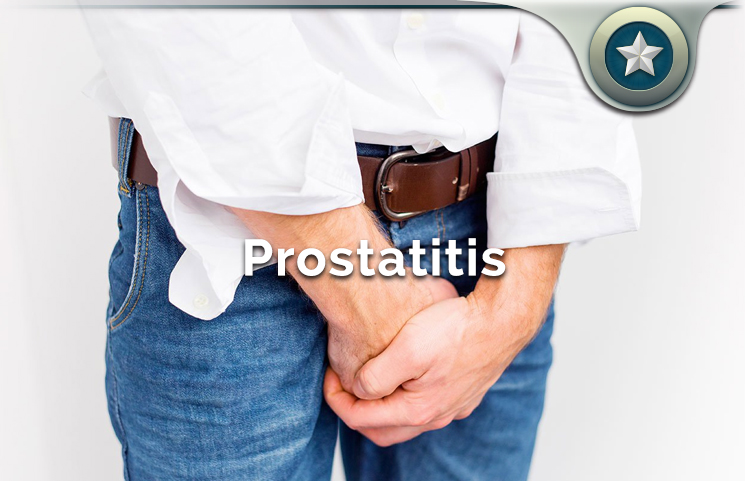Prostatitis is a medical condition or inflammation that affects the prostate gland. Prostatitis presents as several syndromes that have different clinical features. The prostate gland is a walnut-sized gland that is located below the bladder of men. It is responsible for the production of semen fluid that nourishes and transports sperms.
Painful and arduous urination accompanies prostatitis. The pain is felt in the groin, pelvic areas, or the genitals. Sometimes the affected person may complain of flu-like symptoms.
Prostatitis can develop gradually or suddenly depending on the cause. It can improve on its own or with treatment. However, chronic prostatitis can last for months and may keep coming back after treatment.
Prostatitis affects men of all ages. However, it is commonly seen in people who are 50 years or younger. The condition has several causes. The National Institute of Health classified prostatitis in 1999 into four different syndromes. The four syndromes include acute bacterial prostatitis, chronic bacterial prostatitis, chronic prostatitis, and asymptomatic inflammatory prostatitis.
Acute and chronic bacterial prostatitis result from an infection of the prostate gland by bacteria. The conditions can be treated with antibiotic agents alongside supportive care. Chronic prostatitis presents with urological pain complaints in the absence of any infection of the urinary tract. Asymptomatic inflammatory prostatitis presents with prostatic inflammation with no genital complaints. The prostatic inflammation is discovered accidentally. The condition can be discovered during a workup for infertility.
Signs And Symptoms Of Prostatitis
Symptoms of acute Prostatitis may include the following:
1. Painful Urination
This occurs when the patient is unable to pee. As a result, there is a buildup of urine in the bladder. The condition is known as acute urinary retention. It requires urgent medical attention from a doctor.
2. Pain
This pain can be felt in or around the male sex organ, the testicles, anus, lower back, or lower abdomen. The patient may complain of pain during defecation.
3. Urinary Symptoms
These may include pain during urination, frequent urination, and the presence of blood in the urine. There is also a frequent need to pass urine particularly at night.
4. General Unwell Feelings
The patient may feel unwell and may complain of aches, pain, and fever.
5. Discharge
A little discharge may come out of the penis. The discharge is a thick fluid that originated from the urethra.
6. Sexual Dysfunction
Chronic prostatitis can also present with sexual problems such as erectile dysfunction, painful ejaculation, and pain in the pelvis after sex.
7. Enlarged Prostate
An enlarged or tender prostate may be detected during the rectal examination. In some cases, this may be normal. It is advisable to see a general practitioner immediately when any of these symptoms present.

Causes Of Prostatitis
The causes of prostatitis are not completely understood. The bacteria that causes bacterial prostatitis can get into the prostate gland from stool from the rectum.
It can also come from the urethra by backward flow of infected urine. People used to think that prostatitis was transmitted through sexual intercourse. However, scientific studies have revealed that only a small number of prostatitis cases get transmitted sexually. Sexually transmitted organisms that can cause prostatitis include Neisseria gonorrhea, Chlamydia trachomatis, or HIV.
What Are The Risk Factors For Prostatitis?
Prostatitis can affect men of all ages. However, it is more common in middle-aged men. The risk factors for the development of prostatitis include:
- A prior medical history of prostatitis.
- Having a recent case of urinary tract infection. The organism involved in this case is scherichia coli.
- Having undergone a recent urological procedure or having used a urinary catheter can increase the chances of developing prostatitis.
- A catheter is a medical device that is used to draw urine from the bladder.
- Having an enlarged prostate gland can lead to the development of prostatitis.
- A structural or functional abnormality of the urinary tract has also been shown to increase the chances of getting prostatitis.
- Presence of painful abdominal conditions such as irritable bowel syndrome is a risk factor for chronic prostatitis.
- Being middle-aged is a risk for chronic prostatitis.
- Other risk factors include having anal sex and injuring the pelvis.
Diagnosis Of Prostatitis
During diagnosis of prostatitis, the doctor rules out other conditions as the cause of the symptoms that are present in the patient. The process helps the doctor to find out the type of prostatitis the patient has.
The doctor will also ask about the medical history of the patient and the symptoms. A physical exam will be conducted which may also include a digital rectal examination.
The following initial diagnostic tests may be performed:
1. Urine Tests
A sample of urine is analyzed to determine any signs of infection present in the urine. The sample will be taken to the medical lab to determine whether there is an infection.
2. Blood Tests
The doctor will also examine samples of blood to determine whether there are signs of an infection present in the blood.
3. Post-Prostate Massage
The doctor may also massage the prostate and test its secretions. However, this form of analysis is rare.
4. Imaging Tests
A CT scan of the urinary tract and the prostate gland can be ordered for further examination. A sonogram of the prostate can also be ordered. A CT scan is preferred because it is more detailed than a plain X-ray. A sonogram is a visual image obtained through ultrasound.
What Is The Treatment For Prostatitis?
Different urologists prefer various types of treatments. However, the type of therapy used is determined by the kind of prostatitis the patient has. A correct diagnosis is vital because it determines the type of treatment to be used.
It is important to determine whether the symptoms are the result of inflammation of the urethra or a different condition that may lead to damage of the bladder or kidney. Treatment of prostatitis can include:
1. Anti-Inflammatory Agents
The use of anti-inflammatory agents is the conservative treatment method for chronic prostatitis. They can be taken along with sitting in two or three inches of warm water to ease the pain.
2. Antibiotics
Antibiotic can be administered for infectious prostatitis. However, antibiotic agents are not effective for noninfectious prostatitis. Antibiotics should be administered to patients with an acute infectious prostatitis for 14-21 days.
Antibiotics can be used to treat all forms of acute infections. The treatment for chronic infectious prostatitis with antibiotics takes a longer period. The treatment period varies between four to twelve weeks. More than 75 percent cases of chronic infectious prostatitis have been cleared with this form of treatment.
3. Pain Relievers
Pain medications can be administered to help relieve pain. Muscle relaxants can also be administered.
4. Surgery
A surgical procedure can be recommended to remove the infected parts of the prostate gland. The procedure is prescribed to patients with severe cases of chronic prostatitis. Patients whose swollen prostate gland blocks urine passage can also be put through a surgical procedure.
5. Therapy
Supportive therapies for chronic prostatitis may involve the administration of stool softeners and massage of the prostate.
Other Treatments
Other treatments for chronic noninfectious prostatitis may include the administration of alpha-blocker agents. The drugs help relax the muscles of the prostate and bladder. Relaxation of these muscles ensures a smooth outflow of urine.
Medications that lower the hormones levels can help shrink the prostate gland. Other people may benefit from avoiding the consumption of spicy foods and caffeinated drinks. Activities such as bicycling may need to be avoided as well since they may worsen the condition.
Several forms of treatment can be used to manage noninfectious chronic prostatitis. They include progressive relaxation, exercise, myofascial trigger point, and counseling. Prostatitis is a treatable condition. In rare cases where the disease cannot be treated, the patient can be completely relieved from its symptoms by complying with the doctor’s directions.
It is advisable to strictly follow the full course of treatment, even after the symptoms have disappeared. In some cases, such as infectious prostatitis, symptoms may disappear before the causative agent is eliminated.

Complications Of Acute Prostatitis
Rarely, other complications may occur as result of acute prostatitis. They may include:
Acute Urinary Retention
Pain during micturition can lead to the buildup of urine in the bladder. The accumulation of urine in the bladder can cause pain in the lower abdomen and an inability to pass urine. A catheter can be administered to help pass urine in such cases.
Prostate Abscess
An abscess develops in the prostate gland when antibiotics are not effective in treating a prostate infection. A prostate abscess can be suspected if the symptoms do not improve upon administration of antibiotic agents. Other tests such as a CT scan or ultrasound scan will be required to confirm the presence of a prostate abscess. A surgical procedure will be performed to drain the prostate gland.
Other Complications
Other complications of acute prostatitis may include bacterial infection of the blood and semen abnormality and infertility. Inflammation of the coiled tube that is attached to the back of the testicle may also occur.
Prostatitis Conclusion
Prostatitis is not a contagious disease. One can live a normal life without the fear of passing it on to other people. Contrary to common belief, having prostatitis does not increase the chances of getting prostate cancer.









